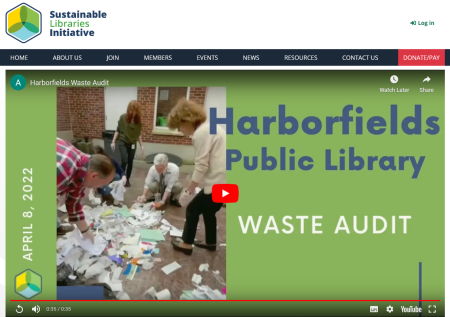ACTIONS
- Protect and safeguard cultural and natural heritage
- Learning and educational opportunities
- Cultural participation/social inclusion
- Sustainable tourism
- Support research
- Employment (recruiting, training, safety)
- Energy consumption, greenhouse gas emissions
- Waste management and reduction
- Transport (forms of, energy use)
- Commercial activities including copyright and IP
- Governance and management
- Security, disaster preparedness, risk reduction
- External partnerships and collaborations
- Toolkit/framework/roadmap
- Case studies
- Video
SLI Waste Audit
- Sustainable Libraries Initiative (SLI)
“The purpose of this task is to discover what types of waste are produced and in what quantity during a set timeframe.”
Avaiable in
- English
5Ps
SDGs LINKAGES
The resource is most closely linked to SDG 12.5 (reduce waste generation) ad 12.6 (adopt sustainable practices and reporting), as well as 12.2 (sustainable use of natural resources), 12.3 (reduce food waste) and SDG 14.1 (reduce marine pollution).
Click on the SDG Target to discover Our Collections Matter indicators
-
Our Collections Matter indicators:
- Reduction of material footprint in terms of reductions in consumption of biomass, fossil fuels, metal ores and non-metal ores.
-
Our Collections Matter indicators:
- Quantities, and reduction in quantities, of food waste, both in terms of waste going for treatment, and waste going to landfill or being otherwise discarded into the environment.
- Policies and plans in place to reduce and eliminate food waste as soon as possible.
-
Our Collections Matter indicators:
- Quantity and reductions in quantity of waste of all kinds, including avoidance/prevention of waste production, reuse, and recycling. Quantity of material recycled in comparison with quantity sent to landfill. Increases in recycling rate in comparison with landfill.
-
Our Collections Matter indicators:
- Clear visions, strategies and plans in place for all aspects of sustainability – environmental, social and economic (people, planet, prosperity)- across all areas of activity.
- Visions, strategies and plans relating to sustainability to be publicly available and incorporated into planning documents.
- Commitments to be in line with local, regional, national and/or international targets and ambitions.
- Incorporation of sustainability into reporting for funders and other stakeholders, including the public. Reporting to include commitments and progress towards targets.
-
Our Collections Matter indicators:
- Number of collections-related programmes, for example research and education, that aim to reduce marine pollution.
- Quantity, and reduction, of waste of all sorts, with plans in place to eliminate waste of all sorts as soon as possible.
- Quantity, and reduction, of plastic waste, with plans in place to eliminate the production and release of plastic waste as soon as possible.

